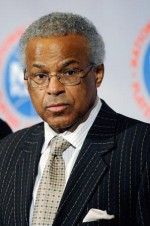NBA Players Union Benches Leader

There is a big controversy brewing in the NBA. Billy Hunter, the executive director of the NBA Players Union, was fired on February 16, causing much controversy among the basketball community.
National Basketball Players Association (NBPA) president and the newest member of the Oklahoma City Thunder, Derek Fisher, said, “This is our union and we have to take it back.”
Trouble between Fisher and Hunter began during the 2011 NBA lockout. The 161-day lockout focused on division of revenue and the structure of the salary cap and luxury tax. Hunter persuaded the executive committee to vote to request Fisher’s resignation, but Fisher did not resign. Instead, he pushed for outside review that took eight months and cost the union over $4 million dollars. Because of this decision, tensions arose between Fisher
and Hunter.
The NBPA represents all professional basketball players and has many important responsibilities. Some of these duties include the negotiation of the terms of collective bargaining agreements (terms of employment), ensuring the NBA and its teams meet the obligations set by the collective bargaining agreement, monitoring administration of retirement and insurance benefits, assisting with charity organizations and promoting positive images of NBA players on and off the court.
Because of the vital role the NBPA plays in the lives of players, many are involved in the decisionmaking processes. The executive committee, headed by Fisher, consists of nine active players, including Chris Paul of the L.A. Clippers. In addition, each team has a player representative and alternate player representative to vote on important matters. Since the issue of Hunter’s employment was so important, many big players that are not team representatives got involved. LeBron James, arguably the biggest name in basketball right now, was present at the meeting on February 16. Given that basketball superstars had not previously gotten involved with league matters, James’s involvement opened a new, contentious chapter for the NBPA.
After a review of union activities was released in January, Fisher said change seemed inevitable. A 469-page review conducted by the law firm Paul, Weiss, Rifkind, Wharton & Harrison LLP revealed that while Hunter was not guilty of criminal activity, he was cited for conflicts such as nepotism and abuse of
union resources.
Hunter employed his daughter, daughter-in-law and the financial institution that his son worked for. Since the review, Hunter fired both his daughter and daughter-in-law, cut ties with his son’s financial institution, and instituted an anti-nepotism policy in the NBA. The review also divulged that Hunter’s 2010 contract extension was not properly
ratified by union rules. This opened the door to investigations about travel and gift expenses. Through reviewing emails, documents and interviewing over three dozen witnesses, it was discovered that Hunter spent over $100,000 on gifts for executive committee members and accepted a payout of $1.3 million for unused vacation time.
Hunter was put on leave of absence on February 1. On February 16, NBA team representatives unanimously voted 24-0 to terminate the 17-year employment of Billy Hunter. Hunter had led the union since 1996 and had negotiated three collective bargaining agreements. He also got the league through two lockouts, both of which ended with players accepting a smaller share of league revenue as well as more restrictions on player contracts. While Hunter did raise the average salary to more than $5 million, the highest in professional team sports, his indiscretions proved to be too much for the players to overlook.
Unfortunately, the decision made by the NBPA is not the end of the matter. In fact, Hunter said he had “yet to receive any notification” of his release. Hunter continued to hint at a legal challenge, most likely to claim the $10.5 million remaining on his contract. Because of the terms of Hunter’s contract, the league would have to prove embezzlement, theft, larceny, material fraud, “other acts of dishonesty,” failure to perform his duties or conviction of a felony to strip him of his pay. While no criminal wrongdoings were found, the extension of his contract was not properly approved in 2010 and the NBPA will argue the contract is unenforceable.
Hunter is currently under investigation by the United States Attorney General’s office, the Department of Labor and the New York Attorney General. Ron Klempner, the union’s deputy counsel, is currently serving as the interim executive director of the league. Hunter is less than satisfied with his termination, for he criticized the interim regime and questioned the eligibility of the members
who voted.
“The current interim regime in control of the NBPA has set a terrible precedent for the union. It violates every tenet of fairness upon which the union was founded. Now that this has occurred, I will continue to examine all of my options, including whether the fairness that was absent from the NBPA process might be available to a different forum,” Hunter said to the Associated Press. Because of the legal questions surrounding the members who voted, Hunter does “not consider today’s vote the end, only a different beginning.”
While facing much legal and public scrutiny, Fisher said, “We want to make it clear that we are here to serve only the best interests of the players. No threats, no lies, no distractions will stop us from serving our membership.”
This conflict is sure to continue well into the season and through the playoffs.
Contact Kristen Duarte at



